Category: BGP
BGP Challenge: Merge Autonomous Systems
Here’s a challenge in case you get bored during the Christmas break: merge two networks running BGP (two autonomous systems) without changing anything but the configurations of the routers connecting them (the red BGP session in the diagram). I won’t give you any hints; you can discuss it in the comments or a GitHub discussion.

Hopefully, you won’t have to deal with something similar in real life, but then we know that crazy requirements trump good designs any day of the week.
BGP Labs: Use BGP Communities in a Routing Policy
A previous BGP lab focused on the customer side of BGP communities: adding them to BGP updates to influence upstream ISP behavior. Today’s lab focuses on the ISP side of the equation: using BGP communities in a routing policy to implement RFC 1998-style behavior.
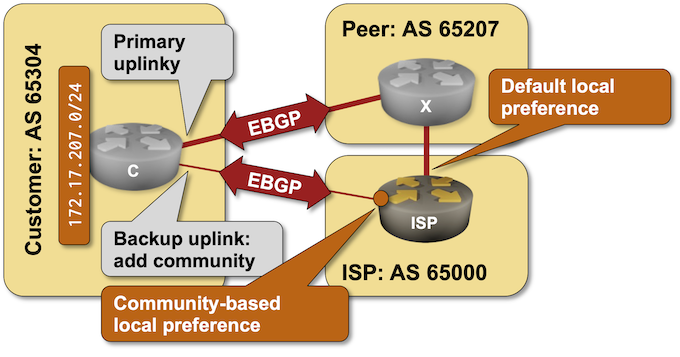
BGP Labs: Use BGP Route Reflectors
In the previous BGP labs, we built a network with two adjacent BGP routers and a larger transit network using IBGP. Now let’s make our transit network scalable with BGP route reflectors, this time using a slightly larger network:
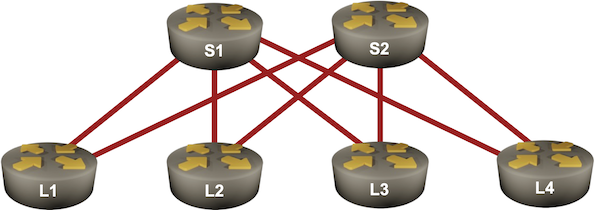
The BGP Origin Attribute
Kristijan Taskovski asked an interesting question related to my BGP AS-prepending lab:
I’ve never personally done this on the net but….wouldn’t the BGP origin code also work with moving one’s ingress traffic similarly to AS PATH?
TL&DR: Sort of, but not exactly. Also, just because you can climb up ropes using shoelaces instead of jumars doesn’t mean you should.
Let’s deal with the moving traffic bit first.
The BGP Multi-Exit Discriminator (MED) Saga
Martijn Van Overbeek left this comment on my LinkedIn post announcing the BGP MED lab:
It might be fixed, but I can recall in the past that there was a lot of quirkiness in multi-vendor environments, especially in how different vendors use it and deal with the setting when the attribute does exist or does not have to exist.
TL&DR: He’s right. It has been fixed (mostly), but the nerd knobs never went away.
In case you’re wondering about the root cause, it was the vagueness of RFC 1771. Now for the full story ;)
BGP Labs: Set BGP Communities on Outgoing Updates
It’s hard to influence the behavior of someone with strong opinions (just ask any parent with a screaming toddler), and trying to persuade an upstream ISP not to send the traffic over a backup link is no exception – sometimes even AS path prepending is not a strong enough argument.
An easy solution to this problem was proposed in 1990s – what if we could attach some extra attributes (called communities just to confuse everyone) to BGP updates and use them to tell adjacent autonomous systems to lower their BGP local preference? You can practice doing that in the Attach BGP Communities to Outgoing BGP Updates lab exercise.
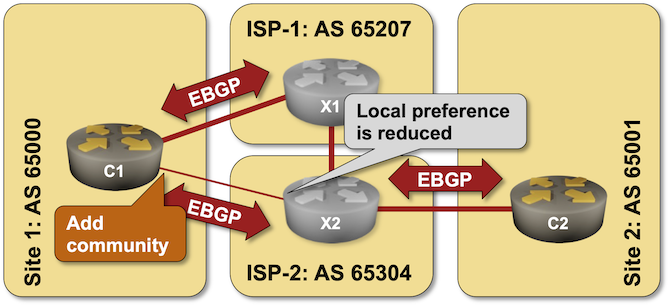
Can a Router Use the Default Route to Reach BGP Next Hops?
TL&DR: Yes.
Starting with RFC 4271, Route Resolvability Condition:
- A route without an outgoing interface is resolvable if its next hop is resolvable without recursively using the same route.
- A route with an outgoing interface is always considered resolvable.
- BGP routes can be resolved through routes with just a next hop or an outgoing interface.
BGP Labs: AS-Path Prepending
In the previous lab, you learned how to use BGP Multi-Exit Discriminator (MED) to influence incoming traffic flow. Unfortunately, MED works only with parallel links to the same network. In a typical Redundant Internet Connectivity scenario, you want to have links to two ISPs, so you need a bigger hammer: AS Path Prepending.
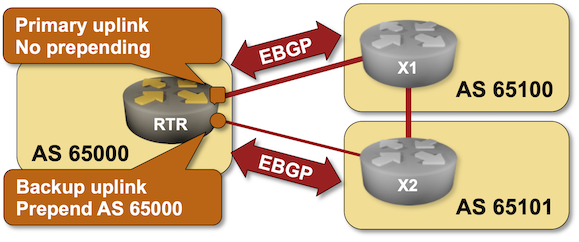
Why Do We Need BGP Identifiers?
A friend of mine sent me an interesting question along these lines:
We all know that in OSPF, the router ID is any 32-bit number, not necessarily an IP address of an interface. The only requirement is that it must be unique throughout the OSPF domain. However, I’ve always wondered what the role of BGP router ID is. RFC 4271 says it should be set to an IP address assigned to that BGP speaker, but where do we use it?
Also, he observed somewhat confusing behavior in the wild:
Take two routers and configure the same BGP identifier on both. Cisco IOS will not establish a session, while IOS XR and Junos will.
I decided to take the challenge and dug deep into the bowels of RFC 4271 and RFC 6286. Here’s what I brought back from that rabbit hole:
Is BGP TTL Security Any Good?
After checking what routers do when they receive a TCP SYN packet from an unknown source, I couldn’t resist checking how they cope with TCP SYN packets with too-low TTL when using TTL security, formally known as The Generalized TTL Security Mechanism (GTSM) defined in RFC 5082.
TL&DR: Not bad: most devices I managed to test did a decent job.
Video: Outages Caused by Bugs in BGP Implementations
The previous BGP-related videos described how fat fingers and malicious actors cause Internet outages.
Today, we’ll focus on the impact of bugs in BGP implementations, from malformed AS paths to mishandled transitive attributes. The examples in the video are a few years old, but you can see similar things in the wild in 2023.
BGP Labs: Using Multi-Exit Discriminator (MED)
In the previous labs, we used BGP weights and Local Preference to select the best link out of an autonomous system and thus change the outgoing traffic flow.
Most edge (end-customer) networks face a different problem – they want to influence the incoming traffic flow, and one of the tools they can use is BGP Multi-Exit Discriminator (MED).
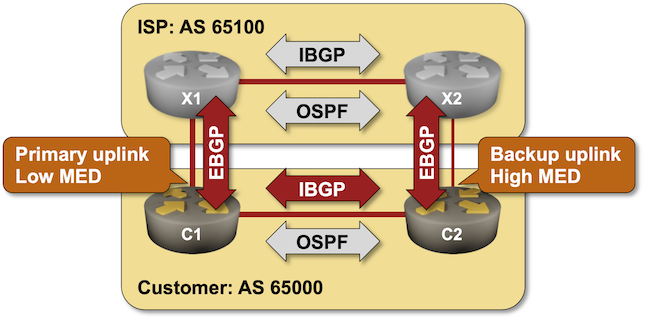
BGP Labs: Using BGP Local Preference
A while ago, we used BGP weights to select the best link out of an autonomous system. In this lab, we’ll use BGP local preference to implement a consistent network-wide routing policy:
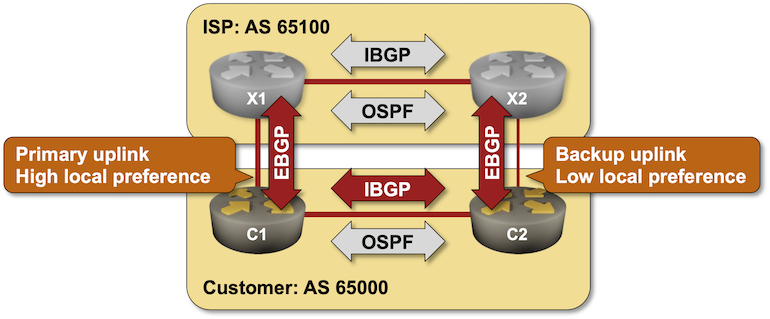
Open BGP Daemons: There's So Many of Them
A while ago, the Networking Notes blog published a link to my “Will Network Devices Reject BGP Sessions from Unknown Sources?” blog post with a hint: use Shodan to find how many BGP routers accept a TCP session from anyone on the Internet.
The results are appalling: you can open a TCP session on port 179 with over 3 million IP addresses.
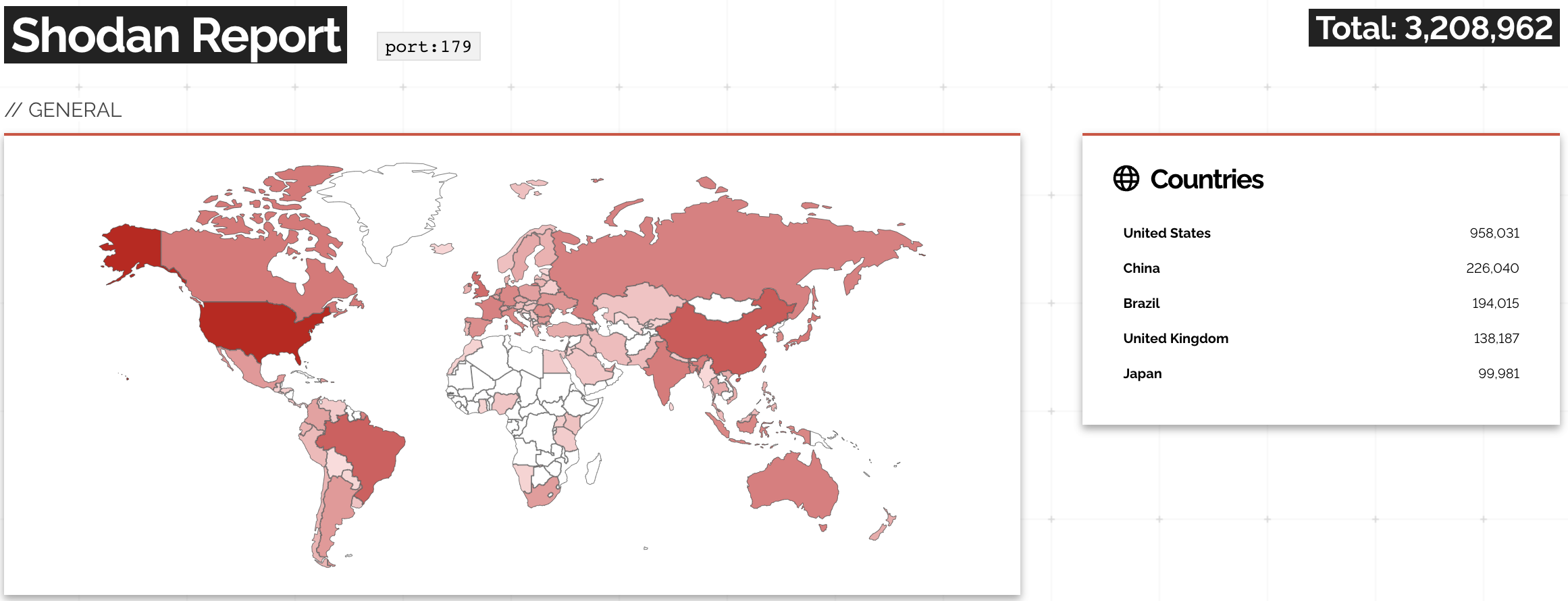
A report on Shodan opening TCP session to port 179
… updated on Wednesday, November 15, 2023 19:38 UTC
Rapid Progress in BGP Route Origin Validation
In 2022, I was invited to speak about Internet routing security at the DEEP conference in Zadar, Croatia. One of the main messages of the presentation was how slow the progress had been even though we had had all the tools available for at least a decade (RFC 7454 was finally published in 2015, and we started writing it in early 2012).
At about that same time, a small group of network operators started cooperating on improving the security and resilience of global routing, eventually resulting in the MANRS initiative – a great place to get an overview of how many Internet Service Providers care about adopting Internet routing security mechanisms.
